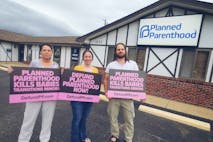
Pro-life organizations call on Congress to protect pregnancy resource centers
Bridget Sielicki
·
Activism·By Anne Marie Williams, RN, BSN
Denver health care practice provides pro-life, whole-life care
A Denver health care facility is showing what providing pro-life care from conception to natural death can look like, and doing so in an economically sustainable way. Students for Life of America founder Kristan Hawkins recently spoke with Dede Chism, nurse practitioner and founder of Bella Health + Wellness, on her Explicitly Pro-Life podcast regarding the innovative pro-life health care model.
Chism is acutely aware of the ways that the culture of death has seeped into many health care professionals’ attitudes, around pregnancy in particular. With over 20 years of experience working as a perinatal nurse practitioner, directly caring for moms in high-risk pregnancies, she’s found that abortion is often regarded as a way to “treat” high-risk pregnancies. “It’s very, very common that a perinatologist, a maternal-fetal medicine specialist, will see a woman with a complication with their child in utero and they will offer them, as an option, an abortion,” she said. “That piece was always a struggle for me.”
Consequently, she understood that pro-lifers need to oppose the acceptance of pro-abortion policies as an automatic default in the practice of mainstream medicine. Though the thought of taking a public stance for life, especially among her colleagues in the obstetrics community, filled Chism with trepidation, she and her daughter Abby, also a nurse practitioner, took the first steps towards opening a pro-life OB/GYN medical practice. Chism distinguished Bella Health +Wellness’s model from the pregnancy care center model, which has typically provided limited services. However, PRCs are trending towards becoming more medicalized, as Live Action News has previously noted.
READ: How the ‘abortion is health care’ claim undermines women’s autonomy
“I came from a fully medical model. My daughter Abby came from a fully medical model,” she said. “I was not familiar at all with the crisis pregnancy center model. So all I knew how to do was to practice medicine. When we opened it, we opened it as a doctor’s office. But what we wanted to be able to attract was people who were questioning what to do next when they were pregnant.”
Given Chism’s personal experience — that abortion-minded women were just as likely to be high-powered business executives as they were to be poor high-schoolers — Bella Health + Wellness sought to reach them all. Though Bella opened as a women’s health clinic in 2014, Chism and her staff were surprised to find within six months of opening, men were coming to them seeking health care as well. Several years after Bella was founded, the organization officially added family medicine to their practice.
“Where we have found that has been so helpful in the pro-life world and especially in people who are having unexpected pregnancies is that guys feel super, super safe coming in and talking with us and giving us a call and telling us what’s going on,” she said. “It’s created a new trusting avenue through their provider, the guys’ healthcare provider.”
Bella has experienced growth beyond its wildest original expectations. Over 200 patients are registering there each month, who receive care at one of the three locations, which include one flagship site and two satellite offices, and they’ve been able to help women who have already resorted to abortion. “I don’t think there’s been one time that we’re not in the middle of at least one abortion pill reversal,” she said. “Last year, during COVID, we had seven going on at the same time, with one set of twins.”

“What we know is that through that approach of dignified healthcare we’ve created a safe access point for people who are considering abortion and looking at their options, and coming to us just from that, but also created relationships, relationships, relationships so that when someone is in a pregnancy that they hadn’t planned on [they know where to go].”
Chism further explained that Bella offers the full scope of care. “If you think of a primary care provider, you’re going to be able to go, from a women’s care standpoint, for your annual exam, your pap smear, STD testing, abnormal periods, ovarian pain, endometriosis, perhaps you need surgery,” she said. [Bella provides] full obstetrical care and prenatal care, including vaginal deliveries and Cesarean sections-full comprehensive women’s healthcare.”
But Bella also provides care for the whole family, offering “full family medicine, so everything from new baby well check-ups, regular annual physicals and exams, sports physicals, high blood pressure, GI problems, everything that you would see at a regular primary care [office], we offer all of those services that you would seek,” she explained. “By taking care of people in all kinds of different circumstances in their lives, then when they do find themselves in an unplanned pregnancy, I’m the first one they call.”
Chism ensures that even when women do choose abortion after all, they understand that they are still welcome at Bella afterwards, where they are still loved and respected. This practice has led post-abortive women to begin the healing process, and, Bella staff hopes, decreases the likelihood of these women making repeat abortion decisions in the future.
With patients all across the socioeconomic spectrum, Bella has found economic sustainability as a private non-profit health care organization, whereby they’re able to fundraise the “20-25% gap” between revenue and expenses that comes from providing no-cost or low-cost care to many of their patients. While many pro-life OB/GYN-only practices struggle for financial solvency, due to caring for large numbers of women with no insurance or Medicaid, Bella has found that the inclusion of family medicine services both helps them reach abortion-vulnerable women, and keep their doors open financially.
Chism highlighted other medical practices operating similarly to the Bella model, including the St. Gianna Clinic in Green Bay, Wisconsin, and WholeLife Authentic Care in Fort Worth, Texas, which both offer “a blend of OB/GYN and family medicine.” She also highlighted Tepeyac Family Center in Virginia, Vitae Clinic in Austin, Texas, and Morning Star OB/GYN in Gilbert, Arizona, which are all OB/GYN-only clinics that offer fertility awareness education and infertility treatment provided by NaProTECHNOLOGY-trained practitioners. Live Action News has previously spotlighted Obria and the Guiding Star Project, which offer pro-life, pro-women’s health care medical services at locations across the country.
“Like” Live Action News on Facebook for more pro-life news and commentary!
Live Action News is pro-life news and commentary from a pro-life perspective.
Contact editor@liveaction.org for questions, corrections, or if you are seeking permission to reprint any Live Action News content.
Guest Articles: To submit a guest article to Live Action News, email editor@liveaction.org with an attached Word document of 800-1000 words. Please also attach any photos relevant to your submission if applicable. If your submission is accepted for publication, you will be notified within three weeks. Guest articles are not compensated (see our Open License Agreement). Thank you for your interest in Live Action News!

Bridget Sielicki
·
Investigative
Carole Novielli
·
Activism
Cassy Cooke
·
Politics
Nancy Flanders
·
Media
Nancy Flanders
·
Activism
Nancy Flanders
·
Human Interest
Anne Marie Williams, RN, BSN
·
Issues
Anne Marie Williams, RN, BSN
·
Analysis
Anne Marie Williams, RN, BSN
·
Analysis
Anne Marie Williams, RN, BSN
·
Issues
Anne Marie Williams, RN, BSN
·